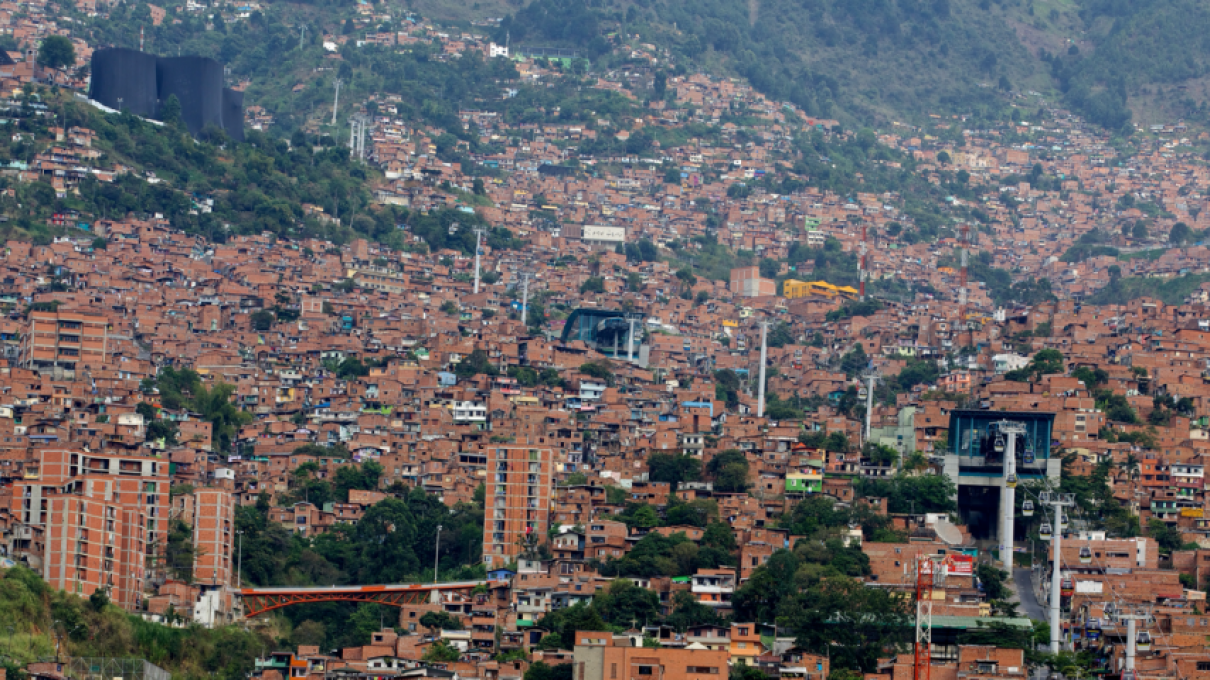Alejandro Echeverri with Lawrence Vale

2022 Charles Correa (1955) Lecture on Housing and Urbanization
Alejandro Echeverri, Cofounder, Director, URBAM, EAFIT University
with Lawrence Vale, Ford Professor of Urban Design and Planning, MIT
2022 Urbanism Spring Lecture Series
Tuesday, 5-April 12:00 – 1:00 PM EST
Co-hosted by the City Design & Development Program (CDD), SMArchS Urbanism Program and Norman B. Leventhal Center for Advanced Urbanism at MIT.
The Annual Charles Correa (1955) lecture, Endless Journey for an Equitable City, will be streamed online here. The webcast link includes a section where you can submit questions to the speaker for the Q&A period in real time.
Alejandro Echeverri with Lawrence Vale
URBAM and MIT
Alejandro Echeverri believes in the ethical responsibility of designers to contribute towards a better society. He is cofounder and Director of URBAM, the Center for Urban and Environmental Studies, at EAFIT University in Medellin, Colombia. His experience combines architectural, urban, environmental projects and planning. He is a Loeb Fellow from Harvard GSD and was given the Obayashi Prize 2016.
Between 2004 and 2008 as Director of EDU, the Empresa de Desarrollo Urbano of the Municipality of Medellin, and then as the city’s director of urban projects, he led the Social Urbanism strategy to improve the most impoverished neighborhoods, with the support and partnership of the city’s mayor Sergio Fajardo; making Medellin a blueprint for the future for other distressed cities worldwide.
Since 2010, from URBAM, he delves into the urban, environmental and social issues of emerging developing countries, particularly those with weak political and institutional structures. He is also active in design through his studio, Alejandro Echeverri + Valencia Arquitectos, focusing on projects with low environmental impact for tropic regions. Alejandro has collaborated as a professor, lecturer and juror in various international and national institutions.
His work has earned the Colombian National Architectural Award in 1996, the Pan-American Biennale in Urban Design Award 2008, the Curry Stone Design Prize in 2009, the 10th Veronica Rudge Green Prize in Urban Design from Harvard GSD in 2013, among others.
Associate Dean Lawrence Vale is Ford Professor of Urban Design and Planning at MIT, where he served as Head of the Department of Urban Studies and Planning from 2002 until January 2009. He has taught in the MIT School of Architecture and Planning since 1988, and he is currently the director of the Resilient Cities Housing Initiative (RCHI), a unit of the School’s Center for Advanced Urbanism. He was president of the Society for American City and Regional Planning History for 2011-2013. Vale holds degrees from Amherst College (B.A. in American Studies, summa cum laude), M.I.T. (S.M.Arch.S.), and the University of Oxford (D.Phil.), which he attended as a Rhodes Scholar. He is the author or editor of eleven books examining urban design, housing and planning.
Much of Professor Vale's most recent published work has examined the history, politics, and design of American public housing. These books include From the Puritans to the Projects: Public Housing and Public Neighbors (2001 "Best Book in Urban Affairs"); and Reclaiming Public Housing: A Half Century of Struggle in Three Public Neighborhoods (2005 Paul Davidoff Award). This research has been supported by a Guggenheim Fellowship, and has also received the Chester Rapkin Award from the Association of Collegiate Schools of Planning, an EDRA/Places Award for “Place Research,” and the John M. Corcoran Award for Community Investment.
More recently, he has completed another trio of books on public housing. Purging the Poorest: Public Housing and the Design Politics of Twice-Cleared Communities (University of Chicago Press, 2013) focuses on Atlanta and Chicago, comparing the slum clearance era that yielded the first public housing with the current spate of public housing demolition and redevelopment. This book has received "best book" awards from both the International Planning History Society (2014) and the Urban Affairs Association (2015). He his also co-editor, with Nicholas Bloom and Fritz Umbach, of Public Housing Myths: Perceptions, Reality and Social Policy (Cornell University Press 2015; 2016 Best Edited Book Award, International Planning History Society). His latest book, published in early 2019 by Oxford University Press, is After the Projects: Public Housing Redevelopment and the Governance of the Poorest Americans This explores the variation of HOPE VI public housing redevelopment practices across the United States, with a focus on New Orleans, Boston, Tucson, and San Francisco. Prior to his work on public housing, Professor Vale was the author of Architecture, Power, and National Identity (1992), a book about capital city design on six continents, which received the 1994 Spiro Kostof Book Award for Architecture and Urbanism from the Society of Architectural Historians. A revised, 2nd edition of the book was published by Routledge in 2008. He is also the author of The Limits of Civil Defence (Macmillan and St. Martin’s Press, 1987), a book based on his dissertation.
Additionally, Vale is co-editor, with Sam Bass Warner, Jr., of Imaging the City: Continuing Struggles and New Directions (2001); co-editor, with Thomas J. Campanella, of The Resilient City: How Modern Cities Recover From Disaster (2005); and co-editor, with Bish Sanyal and Christina Rosan, of Planning Ideas That Matter: Livability, Territoriality, Governance, and Reflective Practice (MIT Press, 2012; 2014 Best Edited Book in Planning History, IPHS). Finally, he is the author of a monograph about the history of the MIT Department of Urban Studies and Planning, Changing Cities: 75 Years of Planning Better Futures at MIT (SA+P Press, 2008).
At MIT, he has won the Institute’s highest award for teaching (MacVicar Faculty Fellowship), and the Institute's highest award for graduate student advising (Frank Perkins Award), as well as multiple departmental awards for advising and service to students.


